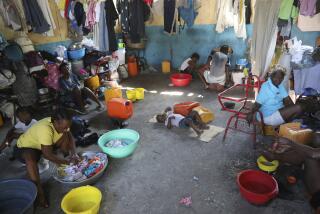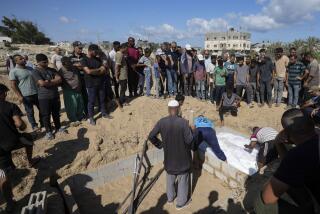In Haiti, funerals are a luxury
- Share via
PORT-AU-PRINCE, HAITI — Life has always been a struggle for Haiti’s poor. These days, death isn’t much easier.
The city morgue is under-refrigerated, jammed to capacity with unclaimed corpses and so short of funds that workers don’t have paper masks to ward off the stench.
Deforestation has inflated the price of coffin wood, and hundreds -- possibly thousands -- of deaths in street violence are pushing up the price of funerals. Robbers plunder graves for coffins to resell, and families try to thwart them by smashing the coffin before it is covered with earth.
Some bereaved families are taking out high-interest “funeral loans,” falling deep into debt to send off relatives with the dignity many were deprived of in life. Others have to abandon their dead on a dusty field known as Titanyen, a Creole word meaning “less than nothing,” on the edge of the capital, Port-au-Prince.
A funeral now costs around $540 -- what most Haitians earn in a year. Cremation is only for the wealthy.
Haiti’s largest public morgue, built to hold 390 cadavers, often has nearly 500, many strewn on the cement floor for lack of space. The dead include shooting victims, AIDS victims and babies who never saw their first birthday.
It costs a relative $27 just to pick up a body if it was dropped off at the morgue, and $47 if the morgue had to collect it off the street. As a result, few bodies are claimed by relatives. They end up in a common grave outside the capital, along with those dumped at the Titanyen field.
“If the families don’t have money to claim the bodies, they simply never show up,” said morgue director Sergo Castor.
Marie Nicola’s son was found dead in the street, his skull bashed in by unknown assailants in the taxi he was driving. The 62-year-old unemployed mother said she did not know whether she would be able to afford a decent burial.
“After you pay the morgue, you have to buy clothes for the body, a coffin and pay the church and the cemetery. We don’t have anything so it’s very hard,” Nicola said outside the morgue as relatives consoled her.
Outside the morgue, freelance undertakers with beaten-up old hearses stand ready to haggle over a funeral price. It’s an entirely uncontrolled market.
“Sometimes you can see the economic situation of the person and you can negotiate a lower price. I’m human too, so it affects me when people want to bury a relative but can’t pay,” said Carl Fanfan, an undertaker.
Father Rick Frechette is a Roman Catholic priest with the Illinois-based charity Friends of the Orphans, which runs an orphanage and a children’s hospital in Haiti.
Trying “to do something a little more human for those that have died,” the group makes coffins from papier-mache instead of wood and provides free burials for about 40 people a month, Frechette said.
Nicola said she planned to ask relatives to chip in for her son’s burial.
“If it’s not enough, then we will sell what we can,” she said softly. “I will give him a good funeral if I’m able to.”
More to Read
Sign up for Essential California
The most important California stories and recommendations in your inbox every morning.
You may occasionally receive promotional content from the Los Angeles Times.










